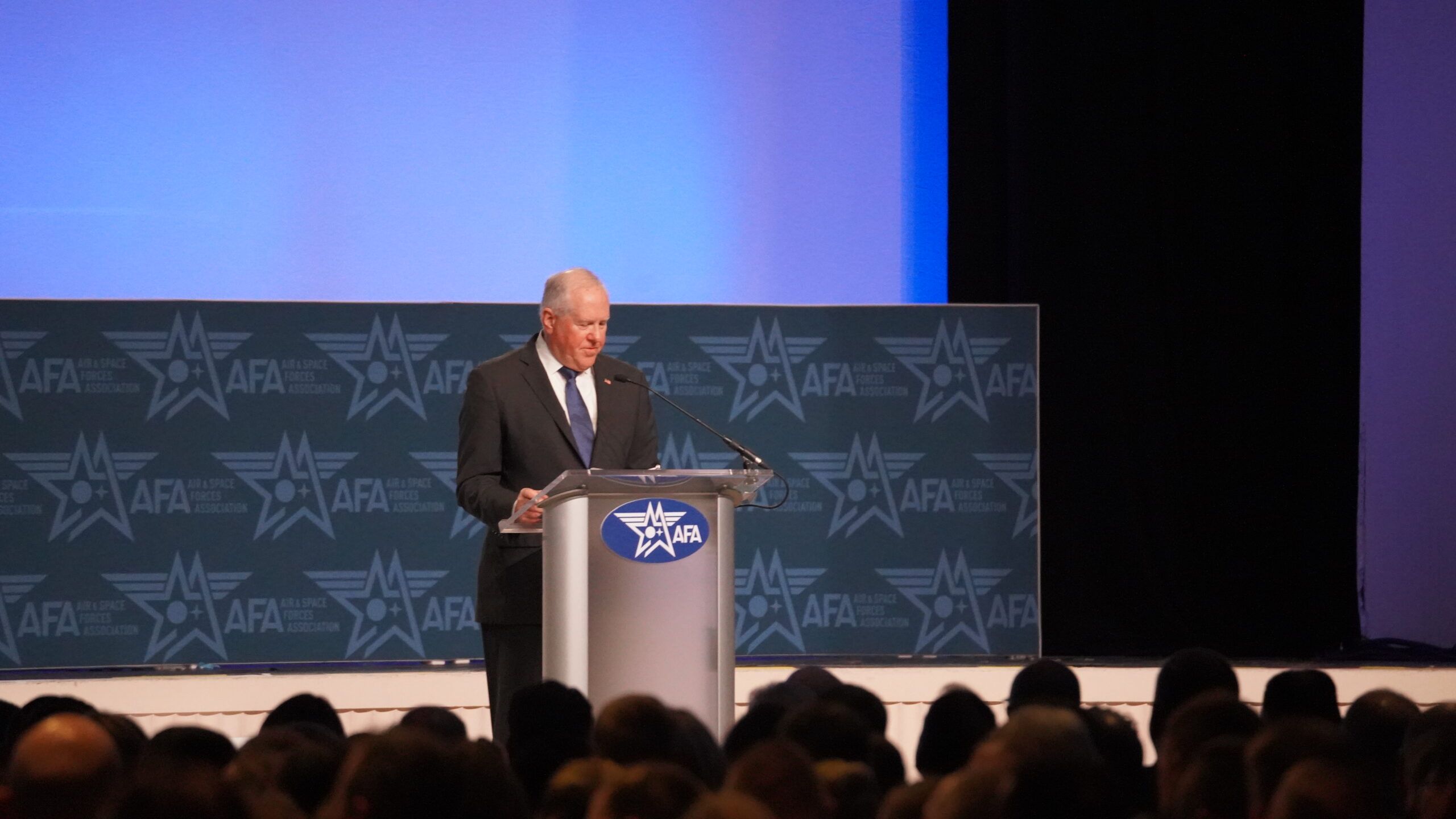
Air Force Secretary Frank Kendall speaks at the keynote of AFA 2023 Day One. (Brendon Smith/Breaking Defense)
WASHINGTON — Five companies are currently in the running in the Air Force’s effort to field collaborative combat aircraft (CCA) drone wingmen, Breaking Defense has learned.
Defense mainstays Boeing, General Atomics, Lockheed Martin, Northrop Grumman and startup Anduril are in the pool of vendors so far selected by the Air Force for an early stage of the CCA program, according to a source familiar with the process. A down select could eliminate some vendors by the summer, the source said.
It’s not clear how many companies could move forward after the downselect, when other vendors could join in, or what other firms are serving as subcontractors in the effort. Air Force acquisition chief Andrew Hunter has made clear that if bidders lose out in one competition, successive on-ramps will be available to them.
When contacted by Breaking Defense, all of the contractors either declined to comment or referred questions to the Air Force. An Air Force spokesperson told Breaking Defense that “several contractors continue to mature their air vehicle designs to field an operational CCA capability as quickly as possible” and that “multiple competitors will be involved for as long as possible” in the CCA program. The spokesperson declined to identify which companies are currently in the mix.
“The CCA acquisition strategy relies upon incremental development, continuous competition with multiple vendors, full-scale prototypes, and speed-to-ramp with available technologies to enable accelerated learning and fielding,” the spokesperson said. “The CCA program is currently on track to deliver in accordance with its acquisition strategy and commitments to the warfighter, but needs the requested FY24 [fiscal 2024] budget to remain on track.”
For CCA, the Air Force envisions a fleet of drones that can serve a range of functions like acting as missile trucks, conducting sensing missions, executing electronic attack or even drawing enemy fire. According to Air Force Secretary Frank Kendall, the service wants to start fielding CCA by fiscal 2028.
Kendall previously announced that the Air Force is seeking an initial tranche of 1,000 CCA and has since said that number could grow. The secretary has set a CCA cost goal of a quarter to a third the price tag of an F-35, whose A-model used by the Air Force has a flyaway cost of $82.5 million. The service’s recent budget request asked Congress for over half a billion dollars for CCA work in FY24 alone.
But the CCA program could lose “a year” of progress if Congress stalls too long on passing the FY24 budget, Kendall warned earlier this month at the Reagan National Defense Forum. At the forum, Kendall told Aviation Week that the Air Force awarded contracts for CCA work, and that the service found “a few places in ’23 where we could get some things started, or reorient some things in some cases.”
Asked about Kendall’s comments, the Air Force spokesperson said the Air Force Research Laboratory’s Skyborg program transitioned into CCA in FY23. Additionally, the spokesperson said the service “began the CCA program with FY23 funds” for efforts that are not new starts and that officials are utilizing current continuing resolution (CR) funding to “invest” in CCA.
However, the spokesperson said two CCA supporting efforts — an experimental operations unit and the Viper Experimentation and Next-gen Operations Model (VENOM) — “begin in FY24 as new starts,” meaning that Congress must pass the FY24 budget before those initiatives can kick off.
Though the Senate has not yet adjourned for the holidays, House lawmakers have been given the all-clear to return to their districts until early January. As a result, the Pentagon will almost certainly have to begin operating in the new year with a continuing resolution (CR) that cuts FY23 spending by one percent due to terms set by the debt ceiling deal reached earlier this year, a cut that could become permanent if Congress fails to pass a budget by the end of April 2024. The stopgap CR currently in effect runs through Feb. 2, where lawmakers could once again pass another CR for an undetermined period of time or approve a full budget.








